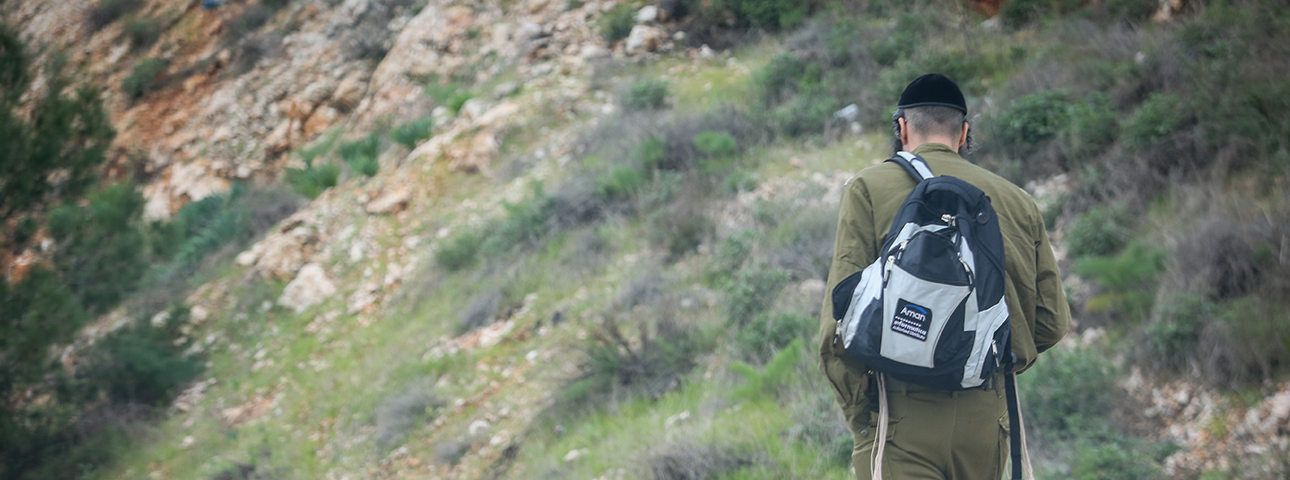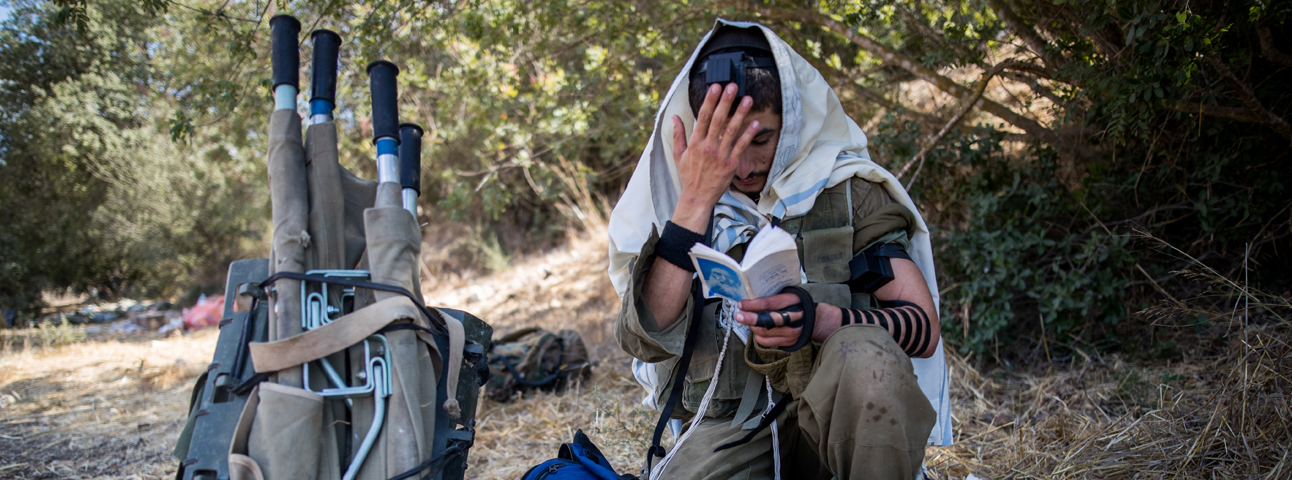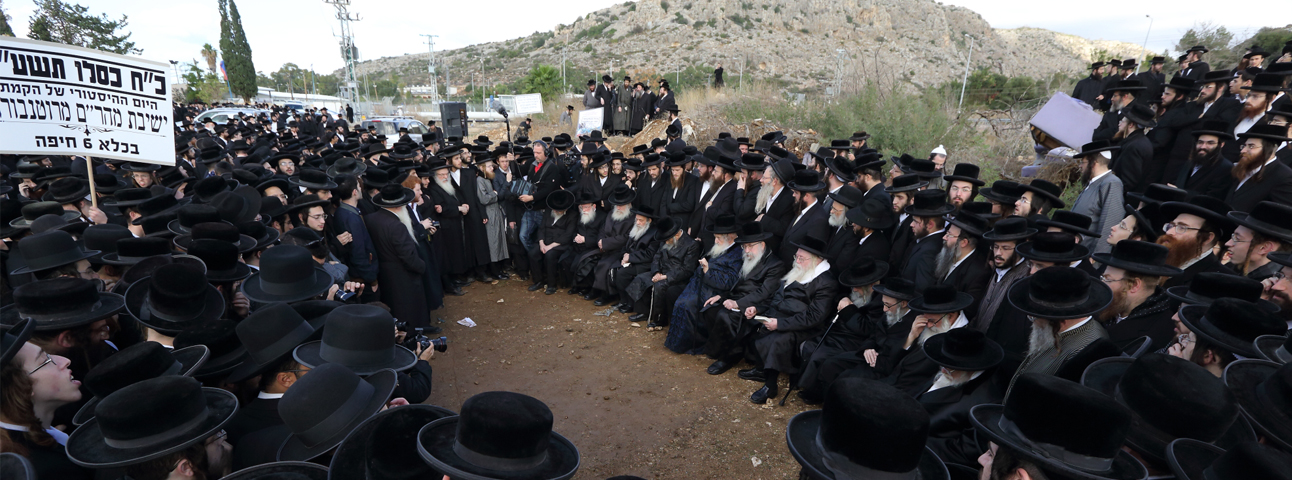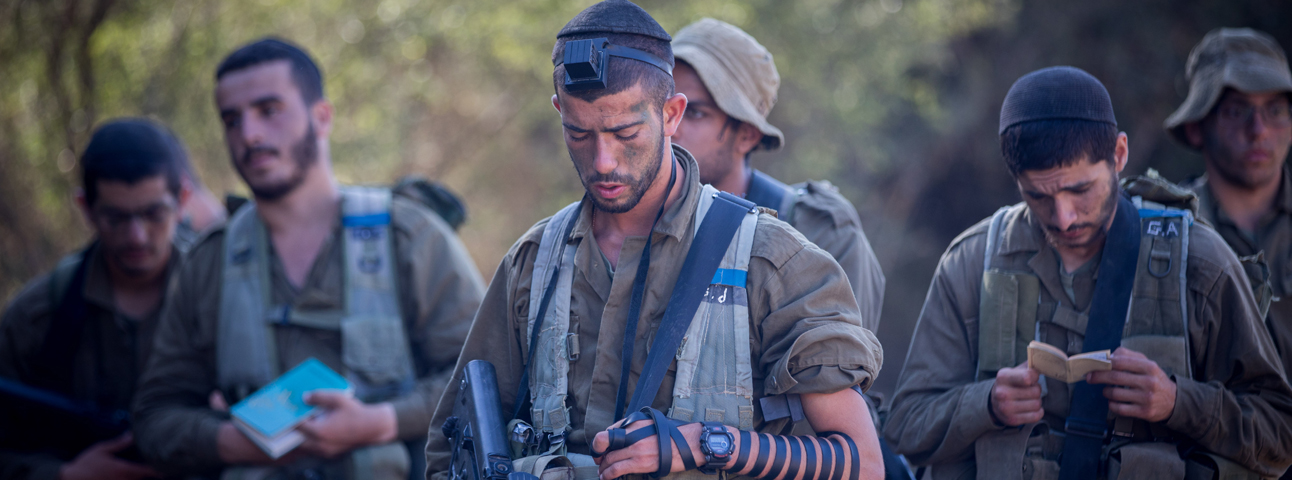The “People’s Army”?
A Historical Review of Ultra-Orthodox Conscription to the IDF.

Illustration | Flash 90
One of the most formidable challenges to the strength and viability of Israel’s mandatory conscription model is the (non-) service in the IDF of the country’s ultra-Orthodox sector. This issue has been a subject of concern for the Israeli public for many years, yet it would appear that no convincing solution is in sight, despite the multitude of political, constitutional, legal, and public efforts to address this highly sensitive subject. The issue goes to the core of the Israeli ethos of the IDF as the “people’s army” –an army based on egalitarian and universal conscription. Thus—alongside the neoliberal, materialistic, and individualistic trends that now challenge this model—the non-service of ultra-Orthodox Israelis in the IDF is the subject of a bitter feud between the majority of Israelis who serve in the army and the ultra-Orthodox minority—a feud which undermines the stability of Israel’s mandatory conscription model.
This article presents the main milestones in the recurring attempts to put a satisfactory arrangement for the deferment of military service for yeshiva students in place. In doing so, it surfaces the changes that have occurred over time in the constitutional, legal, and public responses and attitudes on this issue.

Illustration | Flash 90
I. Exemption from Service in the Early Years of the State, 1948–1977
The controversy over ultra-Orthodox conscription has its roots in the first years of the State. At this critical juncture, an agreement was reached between the leaders of the ultra-Orthodox minority and Israel’s first Prime Minister and Minister of Defense, David Ben-Gurion, to defer the military service of some 400 yeshivaThe “yeshiva” (plural “yeshivot”) is an institute of full-time Torah study for adults. students from the pre-state ultra-Orthodox community, mainly located in Jerusalem. At that time, and under those historical circumstances, this was perceived as a temporary arrangement driven by two forces.
The first was the rehabilitation of the Torah world: In the wake of the destruction of European Jewry, the number of yeshiva students was dramatically reduced, and deferment of service was seen as essential to preserving the study of Torah, , which Ben-Gurion regarded as an important cultural, moral, and social asset.
The second force was the need to maintain unity within the nascent Israeli society, particularly in light of the anti-Zionist position adopted by ultra-Orthodox streams and their strong opposition to the establishment of the Zionist state. The fear of a rift, and of the possible negative influence of Haredi circles on critical international decisions regarding the establishment of the state, led to this compromise, along with others-- including the “status quo” agreements on religion and state.
After about a decade, Ben-Gurion himself began to express doubts about the exemption, and the lack of equity of an arrangement that differentiated between yeshiva students “sacrificing themselves for the study of Torah” and other Jewish youths who are literally laying down their lives in defense of the state.
In 1958, on the basis of a declared intention to conscript yeshiva students after their period of deferment had run out Shimon Peres, then director-general of the Ministry of Defense, reached an additional agreement with the Yeshiva Council, in charge of Yeshivot in Israel since 1941, on extending the period of deferment and the possibility of providing short, three-month military training (“Stage 2”) to men who choose not to continue their Torah studies. These arrangements were maintained until the mid-1960s. In 1968, 4,700 yeshiva students were awarded a service deferment, and it was then-that Minister of Defense Moshe Dayan ruled that a maximum of 800 Torah students, in full-time study at recognized institutions, could join the deferment scheme each year. These quotas remained in effect until the political “revolution” of 1977, with the rise to power of the Likud party.
II. The Political “Revolution” and the Revoking of Quotas, 1977–1986
The political earthquake that brought the Likud to power in 1977 brought with it a major change in government policies and an expansion of the governing coalition to include ultra-Orthodox parties. Pressure from these parties resulted in a decision to cancel the annual quotas for service deferment, and extended the arrangement to others involved in religious work, including yeshiva teachers, municipal rabbis, religious judges, and teachers in the ultra-Orthodox school system—those declaring that “Torah study is their occupation.” It was also decided, that yeshiva teachers aged 30 and over would also be granted terms of service deferment.
These decisions resulted in a fundamental upheaval that led to far-reaching socioeconomic changes in the ultra-Orthodox community, particularly regarding employment patterns among ultra-Orthodox men, who, under the terms of the arrangement, were barred from working for a living or acquiring any non-Torah training. The number of deferments rose steadily, reaching 16,000 in 1985, of various ages. A phenomenon that emerged at this time, and which has intensified over the years, was the rapid decline in the employment rates of ultra-Orthodox men, parallel to the rise in deferments: In 1980, the employment rate stood at 63%, but by 2003 it had plummeted to just 37%.
The ultra-Orthodox community’s rejection of mandatory military service led to the entrenchment of a “society of scholars,” to increased isolationism of this community from the secular majority, and to widening socioeconomic gaps and social rifts between these two communities. . At the same time, from the end of the 1980s onward, there was a rise in political, public, and legal pressures that questioned the necessity and legality of the “Torah study is their occupation” deferment arrangement.
III. The Deferment Arrangement as a Socio-Political Challenge and a Legal Problem, 1986–1998
In light of the rapid growth in the number of deferments, the political arena was forced to re-examine the non-conscription of ultra-Orthodox yeshiva students. As early as 1986, under the Shamir government, a sub-committee of the Knesset Foreign Affairs and Defense Committee (the Hacohen Commission) was appointed to review the issue. The commission found that “the number of exemptions has reached tens of thousands, and there is no alternative but to reassess the arrangement and its period of validity.” This recommendation was not implemented for political and other reasons, and while various legal petitions were made to the courts against the arrangement, none were accepted.
IV. The Tal Commission and the Law of Deferment for Yeshiva Students for whom “Torah is their Occupation,” 1998–2012
By the mid-1990s, the number of deferments had reached more than 25,000, and consequently, there was a shift in the courts’ attitude toward the arrangement’s constitutionality. In 1998, the High Court of Justice ruled that the Minister of Defense did not have the authority to determine the arrangement, and that primary legislation was required.
Following this ruling, Ehud Barak, then Defense Minister and Prime Minister, appointed the Tal Commission, which published its conclusions in 2000. Among other things, the commission recommended two new options aimed at enabling ultra-Orthodox men interested in doing so to serve in the military: (a) Special military service tracks would be set up for ultra-Orthodox soldiers, and arrangements made for the possibility of civilian service as an alternative to the military option; and (b) There would be a “decision year” during which yeshiva students aged 22 and over (whose service, by then, had been deferred four times) could consider entering the workforce by participating in a year of vocational training. After this year, they would be able to choose between military or civilian service on the one hand, and continued Torah study on the other, having declared that “Torah study is their occupation” (Tal Commission Report, 2000).
The commission’s recommendations were applied in the Law on Deferral of Military Service for Yeshiva Students (known as the “Tal Law”), finalized in 2002, and some of its conclusions were implemented. The law was passed with a five-year limit on its implementation, set to expire in August 2007, when it would either be renewed or allowed to expire, depending on the success of its implementation.
Sometime after the law was passed, it was the subject of petitions to the Supreme Court claiming that it was unconstitutional, in that it was fundamentally inequitable and discriminatory toward other groups required to complete full military service. However, in 2006, in response to a petition against the law, the court ruled that its gradual implementation should be continued in order to increase the number of ultra-Orthodox men in military or civilian service, and thereby move towards greater equality in bearing the burden of military service.
One of the main flaws of the law according to the Supreme Court ruling was the fact that it did not set quotas for the number of deferments to be issued each year, neither by the political, nor by the military leadership. This led to the existing situation being maintained, and even to a continued rise in the number of those exempted from service, due both to high birth rates among the ultra-Orthodox population and to the inclusion of additional groups in the arrangement.
In 2008, the Civil-National Service Administration was established within the Prime Minister’s Office, with the aim of advancing implementation of the law. However, due to the law’s intrinsic weaknesses, increases in the number of ultra-Orthodox serving in the military, remained moderate up until the law expired in 2012.
V. Annulment of the Tal Law and Attempts at Legislation in the 2010s
In February 2012, the High Court of Justice struck down the Tal Law as unconstitutional, and required that it be annulled by August of that year. Despite moderate increases in the numbers serving in various service tracks, the court rejected the government’s argument, which sought to focus on the very fact that change was underway rather than on its concrete outcomes. Moreover, the justices declared in their ruling that the Knesset should reach a new arrangement after engaging in serious reflection on the social implications of this its legislation, and should therefore formulate, in the words of Justice Elyakim Rubinstein, “a far more radical solution this time around.”
The annulment of the Tal Law in 2012 marked a dramatic change in the rules of the game and an important milestone in the attempts to define the status of ultra-Orthodox yeshiva students with regards to their military and civilian service. The High Court justices pointed out several s fundamental problems that had led to the law’s failure, the main ones being: (a) lack of oversight of civilian service and its implementation; (b) failure to make the “decision year” into a real turning point for ultra-Orthodox young men, and thus leading to a lower rate of conscription than desired; and (c) the law’s failure to provide incentives for ultra-Orthodox yeshiva students to serve, and particularly to opt for military service over civilian service (Malach, 2012). Following the ruling, the Knesset and the government were forced to explore new and creative ways to increase the rate of military or civilian service among younger ultra-Orthodox men, based on clear and binding targets. To this end, the Plesner Commission, and subsequently the Shaked Commission, were established.
VI. The Shaked Commission and the Conscription Law, 2013–2014
In July 2013, the government established the Commission for Equal Sharing of the Burden of Service, a special commission to discuss a new law on ultra-Orthodox conscription. MK Ayelet Shaked of the Jewish Home party was appointed chair of the commission, whose main goal was to prepare a bill amending the Defense Service Law for second and third readings in the Knesset. The final version of the law was passed by the Knesset plenum in March 2014. The bill prepared by the Shaked Commission was unequivocal in terms of setting quotas and targets for conscription, and with regard to criminal sanctions against those refusing to serve. At the same time, it allowed for an extended “adjustment period” as an interim period before final implementation of the law. The adjustment period was set at three years, from the date of legislation in the summer of 2014 to June 2017; during this time, it was decided that mandatory conscription would not be enforced, and service deferments would be given to yeshiva students.
The new law also set conscription targets that would rise gradually according to a pre-defined track: Of an annual quota of some 8,000 ultra-Orthodox candidates for conscription, around 3,800 would enlist in the IDF and national civilian service in 2014, 4,500 in 2015, and 5,200 in 2016. The power to decide who should be considered “gifted Torah scholars” and not be conscripted would be granted to the yeshivot. If these were to fail to meet the targets set by law, arrest warrants would be issued for those avoiding the draft. Thanks to these targets, and to the development of a dedicated ultra-Orthodox enlistment unit in the IDF Manpower Directorate’s ultra-Orthodox Service Department, the number of ultra-Orthodox enlistees rose between 2011 and 2016, though not still reaching the targets set by the government, as shown in the figure below.
Source: IDF Manpower Directorate

Illustration | Flash 90
VII. Amendment 21 to the Conscription Law, November 2015
Due to pressure from the ultra-Orthodox parties that joined the government after the March 2015 elections for the 20th Knesset and due to subsequent coalition agreements, the law was changed once again. In November 2015, Amendment 21 to the law was passed, , extending the adjustment period by six years, from 2014 to 2020, and redefining it as the “first adjustment period.” Among other provisions, the amendment also moved the final status period back from 2017 to 2020, and restricted it to a three-year period—through to 2023—now redefined as the “second adjustment period.” Similar to the Tal Law, the new amendment once again granted the Minister of Defense the discretion to decide on targets and quotas.
As of this writing (April 2018), an ultra-Orthodox young man aged 18–24 who is single and childless is not allowed to work as long as he has a service deferment under the “Torah study is their occupation” arrangement. As for annual conscription targets, the amendment calls for the formation of an inter-ministerial team to rule on desired targets for military conscription-- under the authority of the Minister of Defense--and for civilian service, under the authority of a designated minister. This team was indeed convened in March 2016, but its conclusions and its recommendations for increasing the number of those serving and preparing them for the labor market have yet to be implemented.
Amendment 21 emptied the original law (passed in the summer of 2014) of any meaning, because with no clear targets to serve as the basis or imposing sanctions for avoiding conscription on both individual and institutional levels, the situation returned to what it was before the Tal Law. That is, enlistment of ultra-Orthodox Israelis to the IDF is once again voluntary, rather than being required by law, and is dependent on agreements, understandings, and cooperation between the secular and ultra-Orthodox communities.
In September 2017, the High Court of Justice overruled Amendment 21 on the basis of the same legal reasoning as applied in previous rulings, but this time expressed far less tolerance and patience toward the legislative and executive branches on this issue. The full plenum of justices, headed by Supreme Court Chief Justice Miriam Naor, ruled again that the arrangement is neither constitutional nor proportional, in that it is not equitable and does not include sanctions against those who do not enlist; and further ruled that the law should be annulled within a year. The justices also criticized the temporary nature of the law and the fact that it makes no clear provision for what will happen after the “second adjustment period” in 2023; and offers no hope of any significant change in the desired conscription arrangement for the ultra-Orthodox following this period.
Nevertheless, the number of ultra-Orthodox conscripts has risen in recent years, mainly due to unique and significant financial incentives including a high wage for those who enlist, subsidies for vocational studies in the course of service, and long-term economic benefits derived from the opportunity to attain work experience, thus easing the process of entry to the labor market after completion of service.
| Number of Deferments | Milestone | Year |
| Approx. 400 | Deferment of service for the ultra-Orthodox during Ben-Gurion government | 1948 |
| 1,240 | The Minister of Defense attempts to conscript ultra-Orthodox following deferment period | 1954 |
| 4,700 | Ministerial committee set up to examine the “Torah study is their occupation” arrangement | 1968 |
| 8,260 | Political “revolution”—the first Begin government; cancelation of quotas for service deferment under the “Torah study is their occupation” arrangement | 1977 |
| 16,000 | The Hacohen Commission set up to examine the “Torah study is their occupation” arrangement; the High Court of Justice rejects a petition on this issue | 1986 |
| 24,000 | The Yisraeli Commission set up to increase supervision over service deferment arrangements | 1992 |
| 31,174 | The High Court of Justice accepts petition against deferment, and requires the Knesset to pass legislation on the issue, leading to the Tal Commission | 1999–2002 |
| 36,887 | The “Tal Law” (Deferral of Military Service for Yeshiva Students Law) passed | 2002 |
| The High Court of Justice rejects a petition against the Tal Law; the Knesset decides to extend it for five years | 2007 | |
| 63,000 | A Knesset review committee (the Plesner Commission) determines that the Tal Law has failed | 2011–2012 |
| 53,000 | The High Court of Justice overturns the Tal Law and requires the Knesset to pass primary legislation on the service deferment arrangement | 2012* |
| 59,553 | The Shaked Commission and Amendment 19 to the Defense Service Law: mandatory targets set for conscription; individual and institutional sanctions to be imposed on draft dodgers; an adjustment period defined | 2014** |
| 64,605 | The Knesset passes Amendment 21 to the Defense Service Law: adjustment period and mandatory targets delayed until 2022 | 2015** |
Source: Plesner Commission Report (2012)
* Following Government Resolution 2698 in 2011, exemptions were given to 11,000 men whose service was deferred and had three or more children (Malchi, 2017).
** The data for 2014–2015 are taken from the 2016 Statistical Report on Ultra-Orthodox Society in Israel (Malach, Cahaner, and Choshen, and Kahaner, 2016).

Illustration | Flash 90
Conclusion
The above review reveals that the entire public system—including the Knesset, the government, and the courts—has failed in its attempts to develop satisfactory arrangements for the conscription of ultra-Orthodox men into military or civilian service, despite the significant efforts invested in recent decades in increasing the numbers among the ultra-Orthodox who do serve (see Figure 1 above).
The lack of agreement between various sectors in Israeli society as to the appropriate arrangement for service is a significant barrier to improving relations between the groups within the Jewish collective who do serve and those who do not. It reflects a severe clash of conflicting values and interests that cannot be resolved without dialogue and compromise between these groups.
Today, since the ultra-Orthodox population is no longer the small minority of learned Torah scholars it was during Ben-Gurion’s time, but rather a large, significant, and high-quality segment of the Israeli public, the time has come for this community to fully assume the obligations and rights of all citizens, including the obligation of military service. The ultra-Orthodox community must do its part in increasing the number of those serving in the IDF. This is now a national and civil imperative; without it, it will be impossible to maintain the IDF as a “people’s army.”
- Tags:
- Ultra-Orthodox,
- Security and Democracy,
- Haredi Conscription,
- ultra-Orthodox/Haredi,
- secular and religious Law,
- Security,
- IDF,
- IDF service,
- Equal Sharing of the Burden,
- judicial review,
- Military and Society,
- Israeli society,
- Ultra-Orthodox in Israel Program,
- The Joan and Irwin Jacobs Center for Shared Society
